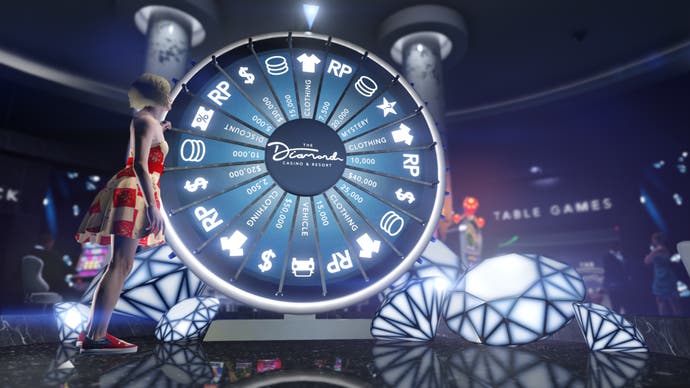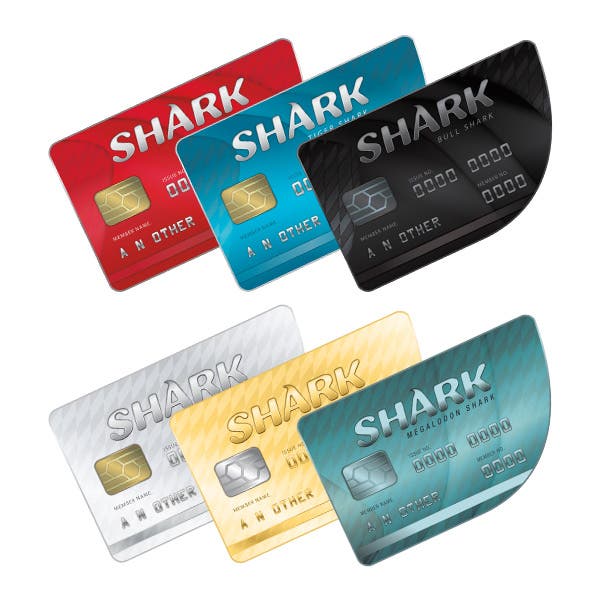GTA's casino isn't the worst of gambling in games - but it puts it in perspective
Full Houser.
This week, the UK's Gambling Commission confirmed to a parliamentary enquiry that loot boxes, FIFA player packs and the like do not constitute gambling under UK law, since there is no official way to cash out your winnings from these blind reward packs. The player, skin or card you might win from a blind pack doesn't have monetary value - officially - so rolling the dice on 'packing' it isn't gambling, even if you paid real money for the privilege.
Also this week, Rockstar opened a casino in Grand Theft Auto Online after a six-year wait. There are no semantics to be unpicked here: it is a straight-up depiction of gambling, and since GTA Online's in-game currency is for sale more-or-less directly in the form of Shark Cards, you can buy in with real money. But once again, you can't cash out - officially. So, at least as far as UK law would have it, it isn't gambling.
It was hardly a shock move from Rockstar, which already allowed players to wager on games of poker in Red Dead Online. It was, you might argue, unhelpful timing for an industry that is under renewed scrutiny from Parliament - and other bodies worldwide - for the playing and spending habits it encourages, particularly in children. But Rockstar is no stranger to such controversy and often courts it. It suits the developer's bad-boy image - not to mention the glossy gangster fiction of GTA. And anyway, the law is on its side.
This isn't the case everywhere. Lawmakers and regulators in Belgium, the Netherlands and elsewhere have ruled loot boxes to be a form of gambling. In Belgium, for example, this has led EA to remove the virtual currency from sale which allows players to buy FIFA Ultimate Team player packs. In such countries, players are reporting that Rockstar has circumvented legal challenge by deactivating the casino games, as they already did for poker in Red Dead Online. If the route to anything resembling gambling is locked off, then it can legitimately keep selling Shark Cards - for which, unlike FIFA Coins, there are many other uses.
I worry a lot about the prevalence of gambling elements in current video games. They are everywhere you look, from mobile puzzle games to online role-playing games and huge console licenses like FIFA. Even when you can't cash out, the value players attach to their in-game items, avatars and progress - not to mention to social prestige in online games - is such that these mechanics can quickly lead to addictive play habits that can be colossally expensive, not great for mental health, and not all that fun. Just ask the jaded player who claims to have spent $15,000 in Fire Emblem Heroes, a mobile game by Nintendo (yes, Nintendo): "I probably became a somewhat problem gambler." No kidding. There's the possibility of these games acting as a gateway activity to real gambling, too, and obviously that is of most concern when it comes to children, who can't gamble legally.
So GTA's brazen entry into this fray is, on one level, a bit scary. But there are actually a few things about Rockstar's approach that I respect - or at any rate, that I find less worrying than the boundary-blurring going on elsewhere.

First, it doesn't pretend to be anything other than what it is - gambling, or at least a simulacrum of it. It's not dressed up like some nostalgic sticker-book collection or capsule toy machine; it's not garlanded with showy crate-opening animations. It's blackjack and slot machines and roulette and the strictly seedy glamour of the real-life casino.
Second, it's a sideshow. Whilst you can argue that it plays directly into the main goal of GTA Online - the accumulation of wealth - it's certainly not the only way to go about it. Nor is it the only way to acquire cosmetic bragging rights; nor is its real-money gambling locked into core game mechanics. That sets it apart from the likes of FIFA in particular, where gambling on opening packs is central to getting better players for your Ultimate Team squad.
Third, and maybe most importantly, it is at least nominally age-appropriate. GTA5 is an 18-rated game. Gambling is, in most countries, legal among adults; it's legal for over-18s in the UK. It seems fair enough to simulate gambling or use gambling mechanics in a game aimed at people who can gamble legally in the real world. (FIFA 19's PEGI age rating is 3.)

But the case of the GTA casino also sheds light on a couple of legal grey areas that muddle the debate about gambling in video games, and make UK regulators, lawmakers and the games industry all look like they're sticking their heads in the sand.
Firstly, you can cash out. Of course you can. It takes a moment's Googling to find a grey market where you can convert GTA dollars back into real money. The same for FIFA coins. If you think loot box systems that aren't linked to a virtual currency are immune to this, take a moment to read about the skin betting trade that exists on the fringes of such games, particularly Counter-Strike.
MPs should consider whether leaving the games industry to clean out its own back alley is really enough
Such practices are usually forbidden in the games' terms and conditions, and the Gambling Commission told Parliament that it thought game makers should be doing more to enforce their T&Cs and stamp out these secondary marketplaces. But it has done so with something of a shrug, pointing out that, according to the law, it is outside the Commission's purview. MPs should consider whether leaving it to the games industry to clean out its own back alley is really enough when children are being sucked into gambling through video games. The shortcut through this problem, taken by Belgium and others, is simply to remove cashing out from the legal definition of gambling. It's quite an extreme step, but it's not unwarranted.
Secondly - and this is an age-old complaint that haunted the debate around violence in video games, long before the one around gambling - age ratings are not enforced, or even taken remotely seriously, by most retailers or by parents. GTA is an 18-rated game but it is certainly marketed directly at younger players. It isn't enough - it never has been - for the industry to wave its hands and say it's not its fault if ratings aren't heeded. It needs to do more to protect younger players.
You know what would focus minds on the issue? If the legal definition of gambling were expanded to include loot boxes, and as a result every game with loot boxes or other forms of expenditure and chance were subject to an 18 rating that, you could be sure, would be much more strictly applied. Wouldn't that be something?


